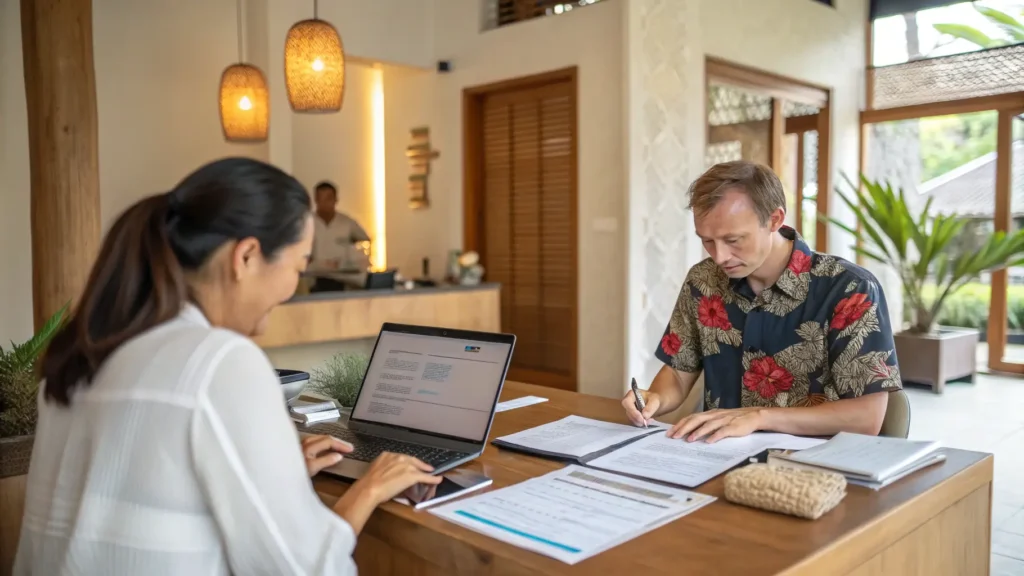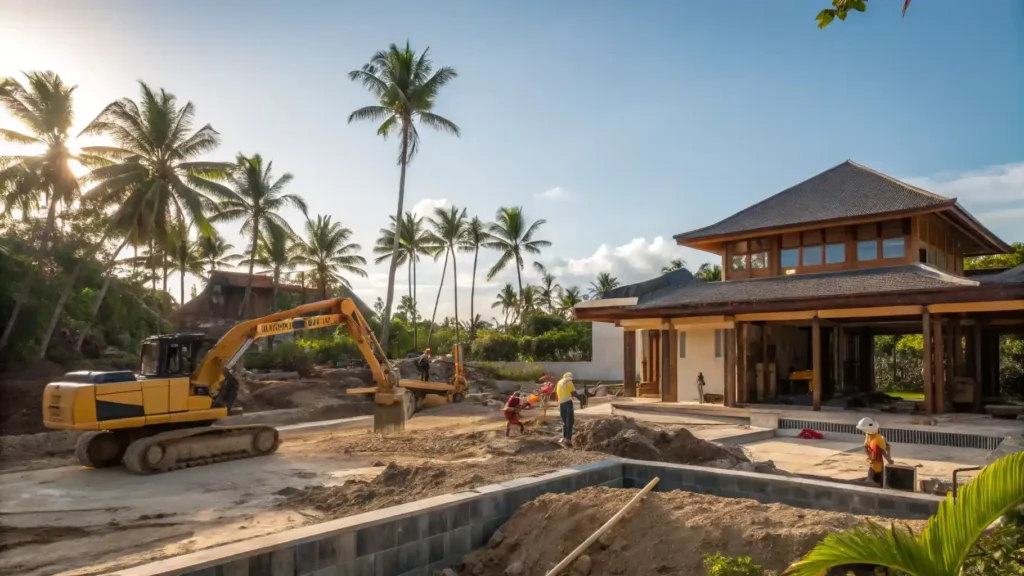How to Buy Property in Bali for Foreigners? Check This Out!
oktarina
August 16, 2025
12 min read

Can foreigners buy property in Bali? If you’re a foreigner and have long dreamed of owning a home or investing in Bali, this question often comes up. Bali, with its stunning natural beauty, beautiful beaches, and rich culture, is a magnet for people worldwide, including those looking to invest in property. Bali is recognized as a popular destination for property investment, ranking as the second most popular destination worldwide and attracting significant interest from foreign buyers. But, even though Bali offers so much potential, there are a few things you need to know before deciding to buy property here.
Buying property in Bali is not as simple as you might think for foreigners. There are specific rules and procedures to follow. Of course, this doesn’t mean that the investment opportunities in Bali are closed off. This article will thoroughly explain how to buy property in Bali for foreigners, what types of ownership options you can choose from, and the steps you need to take to ensure a smooth process. So, if you’re interested in investing or even finding a second home in Bali, keep reading this complete guide to ensure your investment is safe and profitable!
Can Foreigners Buy Property in Bali?
Bali is a paradise for many people looking to invest in property. Its breathtaking natural beauty, peaceful beaches, and laid-back lifestyle make it a prime choice for owning a vacation home or rental property. However, for foreign nationals and any foreign individual interested in owning property in Bali, the process is not as straightforward as it may seem.
As a foreigner, you’re not allowed to own property with a full ownership title (SHM) in Indonesia. Only Indonesian citizens can hold freehold titles and own land outright, so freehold property is generally unavailable to foreign nationals. Foreign individuals have been legally allowed to invest in property in Bali since 2010, but with restrictions under Indonesian law. This means you can’t buy land or property outright like Indonesian citizens can.
Hak Pakai allows foreigners to use land or property for a specified period, usually up to 25 years, with the possibility of extension. The right to use titles does not permit the purchase of bare land and is typically limited to properties with existing structures and minimum property value requirements. On the other hand, Hak Guna Bangunan (HGB) gives foreigners the right to build and manage commercial properties, such as villas or hotels, on land owned by the state or other parties. HGB is valid for up to 30 years and can be extended, providing flexibility for those planning to invest in rental properties or businesses.
Additionally, there’s an important rule to remember: Foreigners cannot buy adat land (customary land) or properties designated for private use without involving a local party. Establishing a foreign-owned company (PT PMA) is a legal way for foreigners to acquire property, not freehold property. Freehold titles are generally only available to Indonesian citizens, and foreigners typically cannot acquire freehold property or own land outright.
How to Buy Property in Bali for Foreigners

Buying property in Bali as a foreigner can be a very profitable investment. However, the process can feel complicated if you don’t know the proper steps. Below is a complete guide to help you navigate every stage of the process, from market research to finalizing the transaction. Understanding property transactions and the legal steps involved is essential to ensure a smooth experience. Following these steps will make you more prepared to own property in Bali without any issues.
1. Step 1: Market Research
Before deciding to buy property in Bali, you must do market research. Bali has various areas with very different characteristics. There’s Canggu, popular with expats and young tourists, offering a modern and dynamic vibe. On the other hand, Ubud is quieter and known for its calm, natural atmosphere, perfect for those wanting a peaceful retreat.
Other areas, like Seminyak, are busier with nightlife and shopping centers, while Nusa Dua offers luxurious housing and beautiful beaches. Each area has different property prices, and its investment potential varies. First, please determine your goal for buying property: for rental, a personal home, or commercial purposes like a villa or hotel. This will significantly influence the location and type of property best for your needs.
2. Step 2: Legal Consultation
The second step is legal consultation. Never underestimate the importance of this because every country has its own rules, and Indonesia is no exception. As a foreigner, you cannot directly buy property with full ownership (SHM). Therefore, working with a lawyer or property consultant who is well-versed in Indonesian regulations is highly recommended. They will help you understand which type of ownership you can take, such as Hak Pakai or Hak Guna Bangunan (HGB). With their help, you can also ensure that the property you’re buying isn’t involved in any legal disputes or other legal issues.
3. Step 3: Choose the Right Ownership Type
Once you understand the market and consult a legal expert, it’s time to choose the ownership type that fits your investment goals. As a foreigner, you can’t own property outright like Indonesians, but there are several options available:
- Hak Pakai: If you only want to use the property for personal purposes, like a vacation home, Hak Pakai is an excellent option. This grants you the right to use land for a period, usually between 25 and 30 years, which can be extended.
- Hak Guna Bangunan (HGB): If you plan to make a commercial investment, such as building a villa or hotel, HGB is the right choice. HGB allows you to build on land owned by others or the state, and the ownership term can last up to 30 years, with the possibility of extension. Unlike a standard leasehold agreement, HGB provides more extensive rights, including the ability to transfer or mortgage the property, making it the most suitable title for commercial or investment purposes.
- PT PMA: If you’re planning a larger property investment, such as a resort or residential complex, setting up a PT PMA (Foreign Investment Company) is the best option. With a PT PMA, you can own property as a legal entity, offering more flexibility for business operations.
Choosing the right type of ownership depends on what you want to achieve with the property. Could you make sure to select the option that aligns with your goals?
4. Step 4: Verify Property Documents
After selecting the right ownership type, the next step is to ensure that the property you’re buying has complete and valid legal documents. This includes checking the Hak Milik (SHM) or Hak Guna Bangunan (HGB) certificates, which prove that the land can be used according to the existing regulations. Additionally, ensure the property has a valid IMB (Building Permit) and complies with local zoning regulations. Other important documents to review during due diligence include the death certificate, marriage certificate, and family card, as these help verify ownership history, confirm familial ties, and ensure legal compliance in property transactions.
Verifying the documents is essential to avoid future problems. Please ensure all property documents are properly registered with the Badan Pertanahan Nasional (BPN) and that there are no legal issues related to the land.
5. Step 5: The Transaction Process
You can proceed to the transaction stage once all documents are verified and in order. Now, you’ll work with a notary to prepare the Akta Jual Beli (Sales Deed). A purchase agreement (Sales Purchase Agreement) is typically signed to formalize the transaction terms and detail the initial payment process. During this process, you must also complete payments, including required taxes such as BPHTB (Land and Building Acquisition Tax) and PPN (Value Added Tax).
Be sure to check all costs involved in the transaction, including notary fees and any additional fees that might arise. All transactions should be conducted transparently and according to the law to prevent confusion later. Avoid using such arrangements as nominee structures, as they can introduce significant legal risks and complications.
6. Step 6: Finalizing the Transaction
The last step is finalizing the transaction. After the payment is complete, the property rights will be transferred to your name or the name of your company (if using PT PMA). This process also involves the notary ensuring all documents are correctly recorded at the land office and the transaction is legally valid.
Once the ownership documents are updated and registered, you’ll officially become the property owner in Bali. However, in some cases—such as with apartments or certain titles—you do not own the underlying land, only the property itself. With these steps, buying property in Bali will go smoothly and according to the applicable regulations.
Read more: Legal Services in Bali: Trusted Solutions for Various Legal Issues
Things to Consider Before Buying Property in Bali

Buying property in Bali can be profitable, but you must consider a few essential things before deciding. Foreign property ownership in Bali involves unique legal complexities, making expert guidance essential. Here are some points to keep in mind:
- Property Legality
Ensure the land you’re buying has a clear legal status and isn’t involved in any legal disputes. Avoid buying adat land or land with unresolved issues. Check with the BPN to verify the legality and ownership of the land. - Zoning and Local Regulations
Bali has different area zoning rules. Some areas may be designated for residential use (homes), while others may be for commercial or business purposes, like villas or hotels. Ensure the property you buy fits your purpose, whether for personal residence or business investment. - Additional Costs
In addition to the property price, there are additional costs to consider, such as taxes, notary fees, and property maintenance costs. Don’t forget about ongoing management costs, especially if you plan to rent it out. Calculate all these costs to avoid any surprises in the future. - Nominee Risks
Some foreigners use a nominee (local Indonesian person) to buy property. While this might seem convenient, it carries legal risks and could result in you losing the property rights. Choosing a legal ownership structure, such as Hak Pakai or Hak Guna Bangunan, is better. Property owners in Bali must also be aware of their legal and tax obligations and the responsibilities that come with ownership or leasehold interests. - Property Condition
Inspect the physical condition of the property thoroughly. Ensure infrastructure like road access, water, electricity systems, and drainage works properly. If necessary, have an inspection done to ensure the property is in good condition and meets your expectations.
Property Management and Maintenance
After acquiring property in Bali, effective property management and regular maintenance become top priorities for foreign owners. Engaging a reputable property management company can help ensure your property is well cared for, whether you plan to use it as a private residence or generate rental income. Conducting proper due diligence before purchase—such as verifying land ownership and checking for unpaid taxes or legal issues—will help safeguard your investment. It’s also essential to understand the ongoing costs of property ownership in Bali, including the 5% acquisition tax and annual property tax obligations. By staying proactive with maintenance and compliance, you can enjoy the benefits of owning property in Bali while maximizing your returns and minimizing potential risks. Property ownership in Bali can be a rewarding and hassle-free experience with the proper support and attention to detail.
Tips for Buying Property in Bali
Buying property in Bali is an exciting investment, but several things must be considered to ensure the process goes smoothly. Here are some tips to help you:
- Use Professional Services
Ensure you work with a lawyer, notary, or experienced property agent who understands the local regulations. They’ll ensure your buying process is safe. You can also take advantage of invest in Bali services and Relocation to Bali, which specialize in helping foreigners to move and buy property in Bali legally and securely. - Do Thorough Research
Before buying, compare property prices in different locations, and research the reputation of the developers offering the property. Location is also key—do you want a property near the beach or in a quieter area like Ubud? Thorough market research will help you make the right decision. - Choose a Strategic Location
If you plan to rent the property, choose a location close to the beach or tourist centers. A good location will offer high rental potential and allow you to earn returns faster. Also, check the facilities and accessibility around the property, like restaurants and transportation. - Review Contracts Carefully
Before signing any contract, ensure you understand all the terms in the agreement, including additional fees and payment schedules. Don’t hesitate to ask your lawyer or notary if anything is unclear. Understanding the contract thoroughly will help prevent problems later on. - Plan Your Finances
Create a budget that includes all costs, from property purchase to long-term maintenance. Don’t forget about taxes and other fees that should be considered to avoid surprise expenses down the road.
Read more: Guide to Buying Property for Foreigners in Bali: What You Need to Know!
Plan Your Property Investment in Bali with Bali Premium Trip!
Bali remains one of the best destinations for property investment, with stunning views, a tropical climate, and a growing demand from tourists and expats. The potential for significant returns makes Bali a top choice for many investors. However, to ensure that your investment is safe and profitable, thoroughly understanding the buying process and the regulations in place is essential.
That’s where Bali Premium Trip comes in. We’re here to guide you through every step of the property investment process in Bali, making it easy, transparent, and secure. We offer consultation services for investment in Bali, helping you choose the right property. With in-depth knowledge of the Bali market, we can recommend strategic locations with high profit potential, whether for personal residence or rental properties. Additionally, we offer property law services in Bali to ensure all your property documents and transactions comply with the regulations.
So, what are you waiting for? Don’t hesitate to contact us to start your property investment journey in Bali with Bali Premium Trip!

Related Article
What Are the Things to Consider When Traveling to Bali During Ramadan?
Many people ask whether traveling to Bali during Ramadan will...
Many people ask whether traveling to Bali during Ramadan will still feel comfortable, and the answer is yes. You can...
9 Tips for Traveling to Bali During Nyepi Celebration You Need to Know!
Bali is known as a destination that always feels alive,...
Bali is known as a destination that always feels alive, with busy beaches, roads that stay active from morning until...
10 Interesting Facts About Nyepi Day in Bali You Should Know
Nyepi Day is one of the most unique and meaningful...
Nyepi Day is one of the most unique and meaningful celebrations in Bali. Every year, the Hindu community in Bali...



